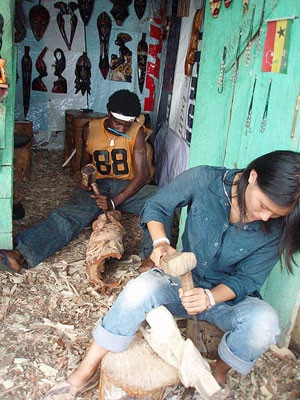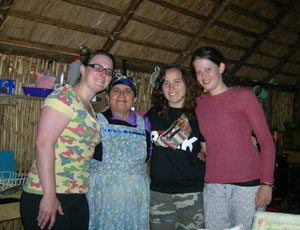When Chia-Wei Chang studied abroad in Ghana last fall, African artists taught her how to select wood from the forest and use a special chisel to create Ghanaian art. She traveled by herself all over Ghana and neighboring countries, took art history and archeology classes at the University of Ghana, and spent a week in Paris on her way home to visit the Louvre and other world-famous museums.
"It was amazing," said the senior art major, 20, who goes by the nickname Chai. "I kept thinking about where I'd be now, where I'd be in Santa Cruz, and thinking I'd never have the opportunity to do this."
The cost for Chang's six-month program was mostly covered by a Gilman Scholarship, an award established by the International Academic Opportunity Act of 2000 and sponsored by the Bureau of Educational and Cultural Affairs at the U.S. Department of State. The Gilman Scholarship offers grants to undergraduate students of limited financial means to pursue academic studies abroad. Each recipient receives up to $5,000 to fund their study abroad program.
Last year, UC Santa Cruz became one of the top five universities in the country in awarding students for the highly selective scholarship.
A growing number of UCSC students are applying for and receiving the award, said Shanté Lewis, Education Abroad Program (EAP) adviser in UCSC's Office of International Education.
Given the state of the economy, financing the Education Abroad Program has become an increasing concern for EAP applicants, she said. So her office increased its outreach to financially needy students. Last year, after sending targeted emails, the office noticed a boost in the number of students who received the Gilman Scholarship.
"A lot of the Education Abroad Program students will tell you that if not for the Gilman Scholarship, they would not be able to fund their study abroad program," said Lewis, a UCSC alumna (Cowell '06) who herself went abroad to Brazil and Ghana with Gilman Scholarships. "It's great to know these resources are out there, and that students are becoming aware of them through our office."
In 2008-09, nine UCSC students went abroad with a Gilman Scholarship. That year, the scholarship received 3,123 applications; 1,226 students were given awards, for a selection rate of 39 percent.
For fall 2009, 14 UCSC students have won Gilman Scholarships. In total, UCSC sends approximately 500 students abroad annually, according to Lewis.
As state budget cuts and resulting fee hikes continue to increase financial pressure on UC students and their families, awards such as the Gilman are more important than ever, said Lewis.
"Students are questioning whether they can afford the cost of a study abroad program," Lewis said. "That's one of the main myths--that it will be too expensive."
Senior Jacqueline Caraves, 20, a Latin American and Latino studies and politics major who studied abroad in fall 2008 in Chile, hears friends and fellow students dismiss the idea of studying abroad because they perceive it as being out of reach.
"I know a lot of people don't do it because they think they can't afford it, and with funding being cut, those opportunities are getting even slimmer," Caraves said. "It's really important to open that up for students from low-income backgrounds."
Studying in Chile was "the best experience I've ever had," she said.
"Especially people who don't usually have the opportunity to get out of their comfort zone or the space they're in, it's a really eye-opening experience, academically, emotionally, personally--in every sense it can be, it is," Caraves said. "It's a way to really grow and really learn about yourself, learn about everything around you, where you come from, where others come from."
Caraves took an intensive language program and political science courses in Chilean capital of Santiago, traveled, and served an internship at a medicinal center run by the Mapuche indigenous people.
The experience "opened me up and pushed me in the right direction," said Caraves. "I came back here and had more insight as to where I want to go as far as politics, my own place in society, and what I can do to change things."
Both Chang and Caraves said they would still have gone abroad, somehow, if they hadn't won the Gilman. But they agreed that the experience would have been lessened because they wouldn't have been able to sustain themselves as long.
For Lewis, seeing others get the opportunity to study in another country is gratifying.
"It's so important for students, both professionally and academically," she said. "Students taking classes in another country become global citizens. So many of them come back saying they have gained respect for other cultures and communities."





